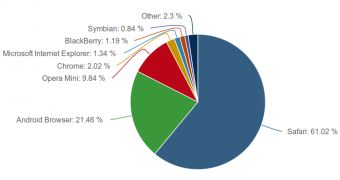On the desktop, Chrome, Firefox and IE are battling out. While different analytics companies show different numbers, these are the big three browsers and nothing else even comes close
On mobile devices, the picture is a lot different. Safari leads of course, by a huge margin, but the competition is much more intense.
In January, Safari had a 61 percent market share in the mobile space, according to Net Applications numbers.
It's not going everywhere any time soon either, Apple may be selling less iPhones and iPads than all Android devices combined, but it still has a large existing market, not to mention much bigger usage.
The Android Browser, aka the one that comes by default, is second with 21.46 percent market share. Nothing too surprising about this either.
Where it gets interesting is below that. Opera Mini manages a decent 9.84 percent market share, a lot more than what Opera gets on the desktop.
But it's going to be hard to hold on to this as more people make the switch from feature phones to smartphones.
Chrome, which is less than a year old on mobile devices, is already at two percent market share, a significant chunk considering it only works on Android 4.0 and above.
Even more impressive is the fact that Chrome only had 1.5 percent market share in December. At this rate, it will become a contender for the second spot as early as this year.
Internet Explorer only has a 1.34 percent market share, indicative of how many Windows Phone devices are out there.
Amazon's Silk browser, found on all Kindle tablets, gets a 0.8 percent market share. Amazon has sold a few million tablets, more than all Android tablets put together, but it's still a small number compared to the number of smartphones out there.

 14 DAY TRIAL //
14 DAY TRIAL //